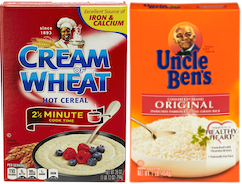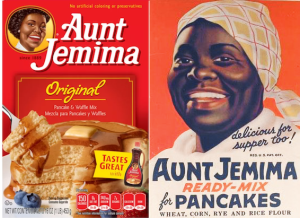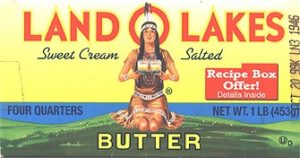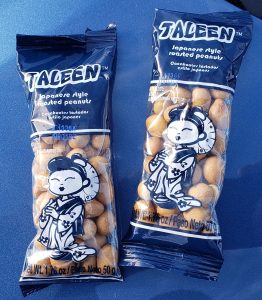
Gil Asakawa
Racial stereotypes used to be part of the American consumer landscape — everywhere you turned, there was a depiction, playful caricature or a ghastly exaggerated image of a person of color on commercials and ads on television or publications or on packaging on store shelves. But if nothing else, the recent years of anti-racism protests in the wake of the murders of George Floyd and the many Black men and women before him and since has awakened mainstream Americans and the media and institutions that serve them and let them know in no uncertain terms that racial images are no longer acceptable.
So, I had to rush to the supermarket in 2020 amidst the first waves of the Covid pandemic to buy up products like Aunt Jemima pancake mix and syrup, Mrs. Butterworth’s syrup, Cream of Wheat, Uncle Ben’s Rice and Land O’Lakes butter and eggs.

Cream of Wheat Hot Cereal and Uncle Ben’s Rice packaging with Black mascots
These products were being removed from store shelves nationwide by their manufacturers because of the racial portrayals used to sell their contents: The smiling happy “Mammy” freed slave woman (albeit a modernized depiction who could be an office worker), the equally contented Black woman’s body that made up the Mrs. Butterworth’s bottle and the — again — equally contented Black men who graced the box of Uncle Ben’s Rice (a train porter waiting to serve you, no doubt) and the smiling Black chef holding up your bowl of Cream of Wheat. Oh, and don’t forget the supplicant Native American maiden in fringed leather dress and beads, her head decorated with a beaded headband and two colorful feathers, holding a box of Land O’Lakes Butter for you.

Left, contemporary Aunt Jemima before cancelation; right, traditional Aunt Jemima
These have been a part of the American shopping and dining experience for literally generations. Hell, Aunt Jemima started hawking pancake mix more than 130 years ago. The fact that we — the entire country, including me — never once gave a thought to the symbolism of these caricatures says a lot about the white-centered, privileged perspective through which we’ve always seen our world.
I bought these products of American culture because my wife and I have given a “Cultural Artifacts” workshop for years with these and more representations, most of which have also been banished. Washington Redskins? Who? Cleveland Indians’ Chief Wahoo? Who? Frito Bandito? Ai-yi-yi-yi, who?

Land O’ Lakes butter package with Indian woman mascot
And that’s a good thing. We really have realized some of our dunderheaded assumptions as a society, and now we’re even working on renaming places across the country with racist names like “Squaw Valley” and “Chinaman Gulch.”
Imagine my surprise and disappointment when I went shopping the other day at my friendly neighborhood King Soopers, part of the Kroger national chain. Near the end of one of the snacks and chips aisles was a cardboard floor display of something called “Taleen Japanese Style Peanuts.”

Taleen Japanese Style Peanuts with racially caricatured illustration
They were decorated with a caricature of a Japanese woman in geisha kimono and knotted air atop her slanty-eyed smiling face with tiny dark lips, holding an open parasol over her shoulder. To finish off the package, the name of the brand was in the wonton font that I consider racist.
I immediately got the clenched-gut sensation I get when I hear the “ching-chong” sound of some jerk imitating Japanese (or Chinese or some other Asian) language. It’s the same feeling I’ve gotten all my life when someone pulls their eyes back and overlaps their upper lip like they have buck teeth.
Taleen Japanese Style Peanuts, with the offensive packaging, is a popular brand where they’re manufactured in Mexico. I’m sure they’re a big hit in the Latinx supermarkets in the U.S. as well. But in an American supermarket chain where you can no longer find Aunt Jemima and the Land O’Lakes Indian maiden, these damned things feel like a slap in the face. My face.
I’m not demanding Taleen stop using the image — it’s on large and small packages of the nuts. But I would like my neighborhood King Soopers to apply the same standards on a product like this that the manufacturer did for the other brands that have evolved.
Aunt Jemima pancake mix and syrup are now branded with “Pearl Milling Company,” ironically the name of the company that invented the pancake mix and the original name for two years until it was recast as Aunt Jemima (after holding auditions for a Black woman to play the part).
My goal isn’t to cancel Taleen, I just want people up and down the supermarket food chain to understand that representation matters. If every other racial stereotype has been banished but Asians are still fair game, at a time when anti-Asian hate is still alive and well, even though the “mainstream” media doesn’t cover the story, then it sets up a frightening inequality and can tell some crazy person out there that Asians are OK to target.
Representation matters. And Asian Americans deserve a place as equal in modern America with all people, all colors.
Gil Asakawa is the author of “Tabemasho! Let’s Eat! A Tasty History of Japanese Food in America,” which will be published by Stone Bridge Press this year. He blogs at www.nikkeiview.com.



